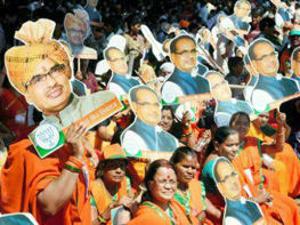
Bhopal, Nov 25: Polling for the Madhya Pradesh assembly began this morning at 8am to decide the fate of 230 seats where 2,583 candidates are in the fray.
The BJP government led by Shivraj Singh Chouhan is fighting for an unprecedented third consecutive victory.
Long queues were seen from morning at many polling booths in major cities of the state, including Bhopal.
Polling in three assembly constituencies of Naxalite affected Balaghat district — Baihar, Lanji and Paraswada — started at 7am and will end at 3pm.
Chief minister Shivraj Singh Chouhan and leader of the opposition in state assembly Ajay Singh were among those who cast their votes early on Monday in their respective constituencies of Budhni and Churhat.
Strict security arrangements have been made all over the state to ensure smooth conduct of polling.
Voting will be held in 53,896 polling booths in 51 districts with an electorate of 4,64,57,724.
Chouhan is contesting from Budhni and Vidisha seats. The other prominent candidates from BJP are state urban development minister and former chief minister Babulal Gaur (Govindpura in Bhopal), forest minister Sartaj Singh (Seoni-Malwa in Hoshangabad district) and parliamentary affairs minister Narottam Mishra (Datia proper in Datia district).
State home minister Uma Shankar Gupta is contesting from Bhopal southwest, while rural development and panchayati raj minister Gopal Bhargava from Rehli and BJP MP Yashodhara Raje Scindia from Shivpuri.
The Congress' candidates are led by Ajay Singh, who is contesting again from the Churhat constituency in Sidhi district.
Another prominent Congress candidate contesting the election is Jaiwardhan Singh, the son of party general secretary and former chief minister Digvijaya Singh. Jaiwardhan is in the race from Raghogarh constituency in Guna district.
Candidates from 12 erstwhile royal families have also thrown their hats in the ring.
Congress has been out of power in the state since it lost elections in December 2003.





Comments
Add new comment